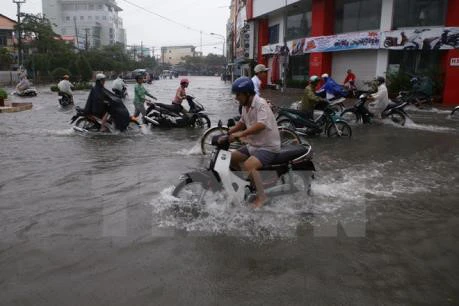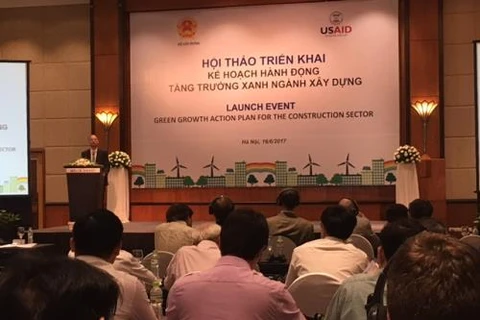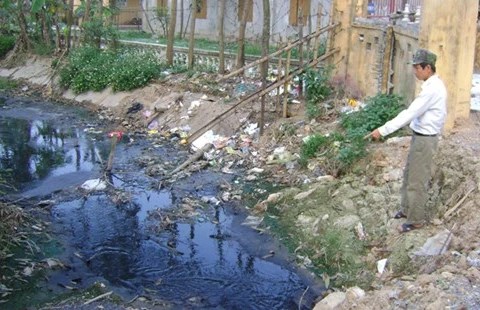Da Nang (VNS/VNA) - Vietnam has given top priority to measures aimed at reducing Greenhouse gas (GHG) emissions, and those that promote climate change resilience, with the aim of seeing an 8 percent GHG reduction by 2030.
Vice Minister of Investment and Planning Nguyen The Phuong made these remarks at the 2018 Green Climate Fund (GCF) Structured Dialogue with Asia in Da Nang on April 17.
He also said that Vietnam would hit its committed target in sustainable development if the country was to receive positive support and funding from the Global Climate Fund (GCF) and its partners in the coming year.
“Many measures have been taken by the government to raise awareness among communities and businesses on the issue of climate change and GHG emissions. The Government has assigned Vietnam Electricity Group to buy renewable power from companies, and encouraged the adoption of ‘green’ technology among new investors in energy,” said Phuong.
He added that private sector and possible GHG emissions industries including construction, agriculture, traffic and ‘smart consumption’ have been promoted, while recycling rubbish, the non-use of plastic, and solar and wind power projects have been set as key ‘green’ industries in 2020.
Phuong said at the GCF’s meeting last year in the Republic of Korea that a non-refundable project worth 30 million USD was given to Vietnam, and the GCF is considering one more project with a funding of between 30 million USD and 40 million USD for the country later this year.
He said that "Vietnam hosting the 2018 GCF Structured Dialogue demonstrates how committed the country is to reaching the green target". He also noted the country’s participation in the Paris Climate Agreement (an agreement within the United Nations Framework Convention on Climate Change dealing with greenhouse gas emissions mitigation).
The four-day dialogue, which drew the participation of more than 130 deputies from 30 Asian countries, will provide a unique venue for these stakeholders to share their experiences in engaging with the GCF across key areas, and highlight strategic opportunities for increasing ambition for climate action in Asia, as well as to identify opportunities for regional cooperation. The discussions will also focus on further developing and refining country specific programmes.
A key objective of GCF dialogues is to determine which priorities identified by country strategies and programmes would be most appropriate for GCF support, given its established investment criteria. The 2017 Green Climate Fund (GCF) Structured Dialogue in Bali identified a roadmap of initial climate actions valued at about 9.6 billion USD, with a requested 2.4 billion USD GCF support in a diverse set of impact areas.
Vietnam is one of the most energy intensive countries in East Asia, and the energy intensity of its GDP is steadily increasing. Improving energy efficiency is the lowest cost option to reducing its greenhouse gas emissions and improve its energy security. According to GCF, GHG emissions are continuing to rise, making the globally agreed target of keeping atmospheric temperature increase below two degrees Celsius more and more difficult to achieve.
The current trajectory of GHG emissions rates will cause global temperatures to increase by four degrees Celsius by the end of this century.
Businesses in Da Nang’s Lien Chieu Industrial Zone (IZ) have applied environmentally-friendly technologies with the aim of reducing their GHG emissions by five percent by 2020.
The city has committed to reducing emissions of carbon by 25,300 tonnes, alongside a reduction in power consumption from 51 million kilowatts per hour to 45.2 million kilowatts per hour, by 2020.
The city has already cut 12,000 tonnes of carbon emissions through a pilot project in the 2008-2011 period.-VNA
Vice Minister of Investment and Planning Nguyen The Phuong made these remarks at the 2018 Green Climate Fund (GCF) Structured Dialogue with Asia in Da Nang on April 17.
He also said that Vietnam would hit its committed target in sustainable development if the country was to receive positive support and funding from the Global Climate Fund (GCF) and its partners in the coming year.
“Many measures have been taken by the government to raise awareness among communities and businesses on the issue of climate change and GHG emissions. The Government has assigned Vietnam Electricity Group to buy renewable power from companies, and encouraged the adoption of ‘green’ technology among new investors in energy,” said Phuong.
He added that private sector and possible GHG emissions industries including construction, agriculture, traffic and ‘smart consumption’ have been promoted, while recycling rubbish, the non-use of plastic, and solar and wind power projects have been set as key ‘green’ industries in 2020.
Phuong said at the GCF’s meeting last year in the Republic of Korea that a non-refundable project worth 30 million USD was given to Vietnam, and the GCF is considering one more project with a funding of between 30 million USD and 40 million USD for the country later this year.
He said that "Vietnam hosting the 2018 GCF Structured Dialogue demonstrates how committed the country is to reaching the green target". He also noted the country’s participation in the Paris Climate Agreement (an agreement within the United Nations Framework Convention on Climate Change dealing with greenhouse gas emissions mitigation).
The four-day dialogue, which drew the participation of more than 130 deputies from 30 Asian countries, will provide a unique venue for these stakeholders to share their experiences in engaging with the GCF across key areas, and highlight strategic opportunities for increasing ambition for climate action in Asia, as well as to identify opportunities for regional cooperation. The discussions will also focus on further developing and refining country specific programmes.
A key objective of GCF dialogues is to determine which priorities identified by country strategies and programmes would be most appropriate for GCF support, given its established investment criteria. The 2017 Green Climate Fund (GCF) Structured Dialogue in Bali identified a roadmap of initial climate actions valued at about 9.6 billion USD, with a requested 2.4 billion USD GCF support in a diverse set of impact areas.
Vietnam is one of the most energy intensive countries in East Asia, and the energy intensity of its GDP is steadily increasing. Improving energy efficiency is the lowest cost option to reducing its greenhouse gas emissions and improve its energy security. According to GCF, GHG emissions are continuing to rise, making the globally agreed target of keeping atmospheric temperature increase below two degrees Celsius more and more difficult to achieve.
The current trajectory of GHG emissions rates will cause global temperatures to increase by four degrees Celsius by the end of this century.
Businesses in Da Nang’s Lien Chieu Industrial Zone (IZ) have applied environmentally-friendly technologies with the aim of reducing their GHG emissions by five percent by 2020.
The city has committed to reducing emissions of carbon by 25,300 tonnes, alongside a reduction in power consumption from 51 million kilowatts per hour to 45.2 million kilowatts per hour, by 2020.
The city has already cut 12,000 tonnes of carbon emissions through a pilot project in the 2008-2011 period.-VNA
VNA
























